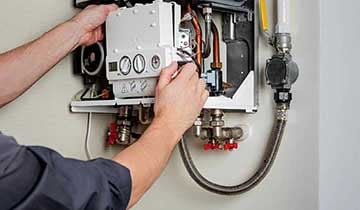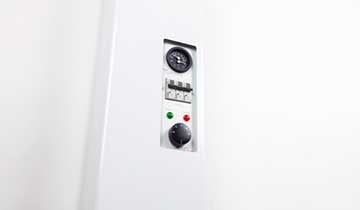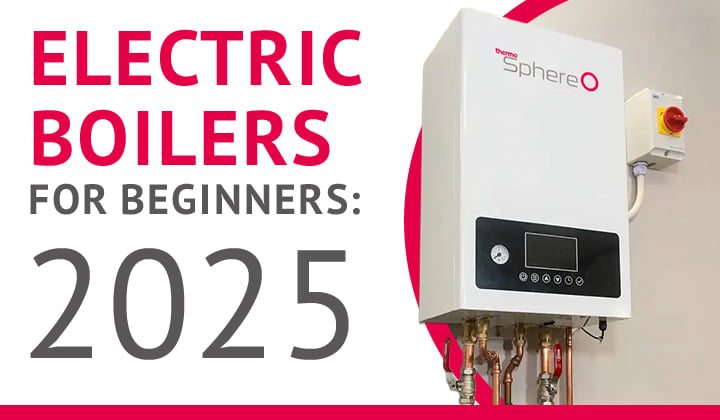9 min read
Electric boilers: An introductory guide for homeowners
How we heat homes is changing and the journey towards reducing carbon emissions is driving it. Gas boilers will be banned from new build developments...

Electric boilers have always been most popular in off grid areas with no mains gas, but with the increases in oil prices and the desire to reduce our reliance on fossil fuels, electric heating systems are on the rise and are becoming a much more realistic option.
The best time to design and fit any heating system is when you’re building the property. But swapping out a gas boiler for an electric one later down the line is quite a simple process. This is largely due to the comparatively simple design of the system and vastly increased safety of an electric boiler.
Most of the hassle will be related to removing your old system. A gas boiler needs to be removed by a gas safe heating engineer so that the gas line can be capped off and made safe. With an oil system the oil feed to the house and the old oil tank will all need to be removed and disposed of safely.
When you’ve removed a gas or oil boiler, you will also remove the flue. With a gas or oil boiler there has to be a flue to vent combustion gases to the outside. Depending on where your boiler was installed, this will leave holes in external walls and possibly ceilings which need to be filled and made good.
If your boiler was manufactured and installed after 2005 then it is likely that you have a condensing boiler. This means there will also be a condensation pipe running through the wall to the outside. This is the pipe that transfers wastewater from your boiler to the sewer, and if your boiler is going, it needs to as well!
Your old boiler and tanks need to be disposed of safely, so you should contact your local council or visit their website to make sure you or your contractor is adhering to the relevant local regulations.
When you’ve got your old system out of the way, installing the new one is relatively easy but there are some considerations to bear in mind.
The main consideration for an electric boiler is the power supply. ThermoSphere electric boilers up to 12kW can be connected to a standard 230V single phase supply. Larger output boilers from 18 to 24kW boilers must be connected to a 400V three phase supply, which is usually only available in larger domestic and commercial properties in the UK.
Your boiler will need to be connected to a dedicated and suitably sized breaker back at your distribution board using the correct size and type of electrical cable. An isolation switch should be provided next to the boiler to allow easy and safe isolation from the electrical supply before any checks or maintenance is carried out.
An electric boiler power supply should be installed by a competent electrician as they will be able to specify and install the correct size breaker in your distribution board and use the correct size and type of cable.
The plumbing connections on an electric boiler are very similar to a gas or oil boiler. The main difference is that there are fewer pipes to connect on an electric boiler because there is no fuel being pumped in. So that means there are no gas or oil pipes to worry about, no flue to install and no condensate pipes. With an electric flow or system boiler there is simply a cold input (return) and a hot output (flow) to connect to your plumbing system. If you’re having an electric combi boiler installed there will also be flow and return connections for the domestic hot water plumbing circuit. These water connections are exactly the same as you would find on a gas or oil boiler, but your plumber might need to modify the pipe work near the boiler to make them all fit the connections on the boiler.
Unlike a heat pump, there is no need to upgrade all of your pipes and radiators when you choose an electric boiler. You can keep everything other that the boiler the same so there are no extra hidden costs. So long as the heating circuit has not changed, and you’re not installing a higher output boiler, any expansion vessels that are already installed can be kept, so long as they are working as they should.
ThermoSphere electric boilers have wiring inputs for central heating thermostats. These are a pair of volt free contacts that are compatible with most central heating controls and wiring centres on the UK market. So, changing your boiler doesn’t mean that you need to change your thermostats and controls!
The size or output of your boiler will dictate the size of the electrical power supply that it will need to operate. As with any heat source, in order to know which size boiler to buy, you first need to know the energy demand for your heating system. You could simply check your old boiler’s output and put in a like for like electric model. For example, if you have a 12kW gas boiler you could install a 12kW electric boiler to meet the same demand.
However, it is worth checking your required heat output before you commit to a new boiler. This is because boilers are often very over-spec’d which means that you’ll sometimes find that the boiler installed is actually too big for the property, not operating efficiently and could actually be replaced with a smaller, less powerful boiler that will use less energy and be cheaper to run while giving you the same levels of comfort.
For a heating only boiler, the general rule of thumb used by heating system designers is to allow 1.5kW of boiler output per radiator. So, using this rule, if you have 8 radiators you should install a 12kW boiler. However, some radiators are going to be much larger than others and also used at different times so the smart thing to do is consider whether you actually need 1.5kW per radiator in your home. For example, a small landing radiator or bathroom towel rail might only require 500W or less, so that is 1kW off your required boiler output straight away, and 1kW of electricity that you don’t have to spend money on. As you can see, it is well worth walking around your house counting radiators and considering where you may not need to allow that 1.5kW, just to see if you can choose a smaller boiler that is more cost effective to run and has less environmental impact.
If you are specifying a boiler to provide hot water for heating and showering, the popular school of thought is to add 3kW to the required output of the boiler. This is considered a ‘failsafe’ but is not really needed, even if you have an electric combi boiler.
The reason for this is that your boiler will only ever be heating up water either heating or hot water at any one time. So, if you calculate that you need 9kW for your heating, system, that same 9kW of heating power will be more than enough to warm the relatively small amount f water running through a coil in your hot water storage cylinder. If you need 9kW to heat your home and you’re also using the boiler to heat a hot water cylinder, then a 9kW boiler would be suitable. There’s no need to overcompensate with a 12kW boiler because this will only lead to unnecessarily high running costs and a more expensive electrical installation.
The ideal way to specify the right boiler is to have an energy assessor visit your home and provide you with heat loss calculations and a required heating output. This is a much more in-depth method specifying a boiler, and it does have a cost attached, but in the long run it’s the best way to ensure you don’t over spec your boiler and pay for energy you don’t actually need to use.
So, there you have it! It is relatively simple to change an old gas or oil-fired boiler for a new zero emissions electric boiler and here’s a checklist of the main considerations:
Complete this short form to receive a new electric boiler quote along with the right specification for your property.
To discuss electric boilers for larger projects, please call one of the team on 0800 019 5899.

9 min read
How we heat homes is changing and the journey towards reducing carbon emissions is driving it. Gas boilers will be banned from new build developments...

9 min read
Electric boilers are similar in size to gas boilers and, on average, slightly cheaper to install. They have appeal to homeowners who live off the gas...

13 min read
If you’ve been hearing more about electric boilers recently, you’re not alone. With the UK government still trying to push towards decarbonised...